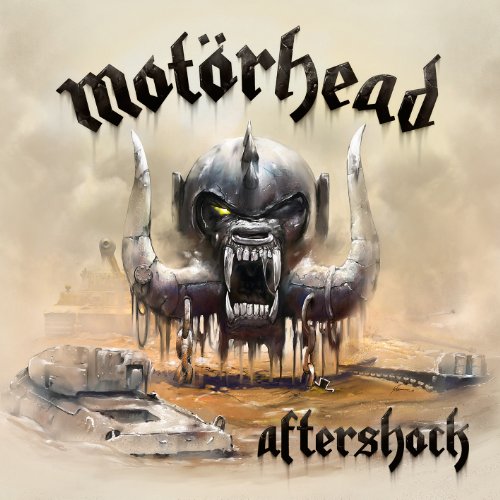
Motörhead
Aftershock
Release Date: Oct 22, 2013
Genre(s): Pop/Rock, Heavy Metal, Hard Rock, British Metal, New Wave of British Heavy Metal
Record label: UDR
Music Critic Score
How the Music Critic Score works
Buy Aftershock from Amazon
Album Review: Aftershock by Motörhead
Very Good, Based on 9 Critics
Based on rating 4
Something’s gone horribly right with the world. Back when Lemmy unleashed Motörhead on an unsuspecting world, no-one could possibly imagine that a 67-year-old would ever sing the same songs they sang as a young man. But 37 years, countless Jack’n’cokes, a mountain of speed, plus more recently type 2 diabetes, defibrillators, and a series of cancelled shows later, and here it is on record, as fast, gruff, heavy, hearty, and hale as the band has ever been.
Based on rating 4/5
Reviewing a Motörhead album is like reviewing a cheeseburger—unless something truly awful has happened, it will at the very worst be pretty damn good. What makes Motörhead so powerful is that they’ve never deviated too far from the formula of kickass rock and roll with whiskey-soaked swagger and massive sack. Such is Aftershock, an album that many were worried wouldn’t happen due to Lemmy’s recent bouts with ill health.
Based on rating 4/5
An inimitable proponent of the "live fast, die young" lifestyle, Motörhead's Lemmy probably didn't expect to make it to 67, but age and hard living are finally catching up with him. In the shape of type 2 diabetes and a defibrillator implant, mortality is both looming large and, inevitably, being given short shrift. "Time to get away from here/ You won't see me shed a tear," he growls on opener Heartbreaker.
Based on rating 7.6/10
To some, Motörhead will always be more icon than band, a series of irreducible images: frontman Lemmy Kilmister tilting his head to sneer into a downturned mic; his trademark muttonchops, moles, and vintage Rickenbacker; that arresting Gothic-font logo, complete with purely cosmetic umlaut. But Motörhead are, above all, a working outfit. The earthy counterpart to grandiose NWOBHM contemporaries Iron Maiden and Judas Priest, they've positioned themselves as the UK answer to ZZ Top—paring down their palette to the bare essentials, cruising the globe decade after decade, and churning out new material in their unmistakable biker-punk thrash'n'roll idiom.
Based on rating 7/10
In the history of music, there are few true mavericks on the level of the legendary Lemmy, a man who seems to do his own thing without any concern for what anyone else thinks about it. This level of confidence has made Motörhead a timeless institution in the world of rock & roll, and on Aftershock, the band's 21st album, it's clear they're not even close to running out of gas. While the band's elemental sound doesn't show much in the way of innovation, the spirit of true rock is so strong within it that it doesn't really matter.
Based on rating 3/5
After 67-year-old Motörhead frontman and all-round rock legend Lemmy suffered a series of health problems earlier this year, you’d think the notorious hellraiser might have decided to slow down a bit. Nuh-uh. And it’s heartening to hear that these issues haven’t altered his band’s no-frills approach one bit. His voice is a bit croakier these days, but the band’s riffs are as pummeling and unforgiving as ever, especially on the opening double-whammy of ‘Heartbreaker’ and ‘Coup De Grace’ and the coruscating ‘Going To Mexico’.
Based on rating 3/5
Even as Lemmy Kilmister closes in on 70, Motörhead's avalanche rock & roll still makes most metal sound rigid in comparison. On Aftershock, "Lost Woman Blues" and "Dust and Glass" relax enough to tap Britain's 1960s blues revival. But your main choice, as ever, is between fast and faster. Endlessly obsessed with damned dames and the fugitive life, Kilmister remains most powerful at his most apocalyptic: piling up molten "Train Kept A Rollin' " riffs in "Death Machine"; "wishing that the future didn't look so grim" in "End of Time." Having gone through a series of health issues, he stares mortality directly in the eye – but that's his job, right? .
Based on rating C+
There is no person who personifies rock ‘n’ roll more than Lemmy of Motörhead. On a steady diet of Jack Daniels and speed, this man dedicated the better part of his life to touring and recording records, becoming a singular metal icon and cult figure along the way. Worshipped by superfans and respected by all, Lemmy is unchanged by time (both as a person and as a musician).
Opinion: Excellent
For those old souls who were seduced by the speed-happy, grime-slicked rock n’ roll of Motörhead in their heyday, but have lost touch since, Aftershock represents a fascinating opportunity to explore just how much of their trademark sound has changed over the years. The timing for a retrospective glance couldn’t be better since the trio of Lemmy Kilmister, Phil Campbell and Mikkey Dee, who currently form Motörhead’s longest-standing partnership of 20 years, have chosen album number twenty-one to reconnect with some of that old school bluster that has made them the legendary act that they are. The first thing you’ll notice, when comparing the old with the new, is that the production values are through the roof.
'Aftershock'
is available now

